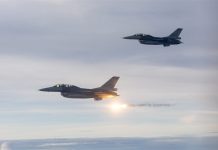The conflict in Ukraine is driving a heightened global need for tungsten as nations seek to amass munitions stockpiles. Yet, the war has considerably diminished available tungsten resources, with China and Russia maintaining a solid grip on the supply.
Russia’s ‘Heroic’ Mouse Riding Kamikaze UAV Slams Into Ukrainian Bunker; Soldiers Erect Monument For Its Sacrifice
Tungsten, a dense and durable metal, is frequently employed in the production of carbide tools designed for processing materials used in various applications, including the manufacturing of automotive components.
Within the defense sector, tungsten finds application in munitions like artillery shells and penetrators, as well as certain armaments deployed via unmanned aerial vehicles.
Tungsten’s characteristics are also harnessed in developing a category of missiles known as “kinetic bombardment” weapons.
These munitions involve propelling tungsten rods at incredibly high speeds toward a target. These rods can effectively penetrate thick steel armor, causing significant, though highly localized, destruction.
:quality(70)/cloudfront-us-east-1.images.arcpublishing.com/archetype/XBTWPDIJRZFFXFL3N3XX67GZEQ.jpg)
Tungsten’s sole contender for this specific use is the radioactive element uranium. Depleted uranium, while almost as dense as tungsten, offers an additional military advantage – it ignites at the extreme temperatures generated when it pierces steel tank armor. This ignition can often trigger the detonation of any explosives inside the tank.
However, following the first Gulf War, depleted uranium left behind dangerous dust when it burned. Surprisingly, in warfare, tungsten stands out as an environmentally friendly alternative.
As the conflict in Ukraine persists with no clear end in sight and the demand for munitions such as artillery shells and penetrators continue to rise, tungsten has experienced a notable increase in demand.
Lewis Black, the CEO of Almonty Industries, a Canadian mining company, told Nikkei Asia that the conflict in Ukraine is driving a surge in worldwide tungsten demand, primarily to support the accumulation of munitions stockpiles.
The CEO of the Canadian company said that the conflict in Ukraine has revealed a critical issue. Developed nations, he explained, are facing a shortage of munitions stockpiles and cannot significantly boost their production beyond the levels maintained over the past three decades.
China’s Dominance In Tungsten Production
Around 12% of the world’s tungsten demand originates from the defense sector. Black pointed out that the shortage of tungsten hinders the current global efforts to boost munitions production.
This situation is exacerbated because the available tungsten supply is often controlled by China and Russia, potentially posing future security challenges.
China dominates the tungsten market, accounting for over 85% of total mine production, with Russia also playing a significant role, collectively representing roughly 90% of the global tungsten supply.
The remaining share comes from countries such as Vietnam, Bolivia, Austria, etc. This concentration of supply raises concerns about potential risks, as seen with China’s recent decision to restrict graphite exports, a crucial component in batteries.
Despite the increasing demand, the non-Chinese supply remains limited, as China’s competitive pricing has led to the decline of competitors in the market. Currently, major tungsten mines outside of China are limited to a few locations, like Austria and Portugal.
![INTERVIEW] Almonty set to mine for Korean tungsten to challenge China's dominance - The Korea Times](https://img.koreatimes.co.kr/upload/newsV2/images/202212/e5172704758b45c28af1ea206adb39a1.jpg/dims/resize/740/optimize)
To diversify the market and reduce dependence on Chinese sources, the Canadian company is working on reopening the Sangdong mine in South Korea with support from the German state-owned development bank, KfW.
When operational, this mine is expected to contribute approximately 30% to 35% of non-Chinese tungsten supply.
This strategic move aligns with Western countries’ efforts to address critical mineral supply chain vulnerabilities, as they recognize the importance of securing access to these resources, especially for clean energy initiatives.
Black emphasized the need for preparedness for worst-case scenarios, as being cut off from Chinese supplies or facing a price collapse without alternative sources would have serious consequences.
Meanwhile, in recent weeks, NATO and British officials have issued frequent warnings, expressing concerns that Western military forces are running low on ammunition to provide to Ukraine.
They have called on member nations to increase their production efforts to support Ukraine in its ongoing conflict against Russia. These unfolding events bring concerning implications for Ukraine, given that its war with neighboring Russia has persisted for 20 months.
Moreover, it is anticipated that the demand for munitions will further increase shortly, especially as the conflict between Hamas and Israel is expected to escalate in the coming days.
- Contact the author at ashishmichel(at)gmail.com
- Follow EurAsian Times on Google News




